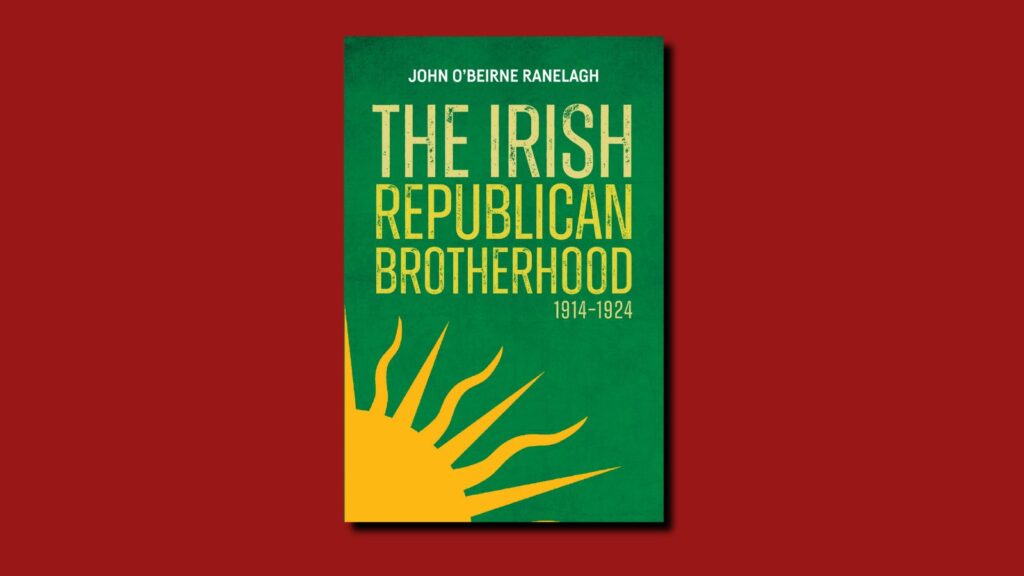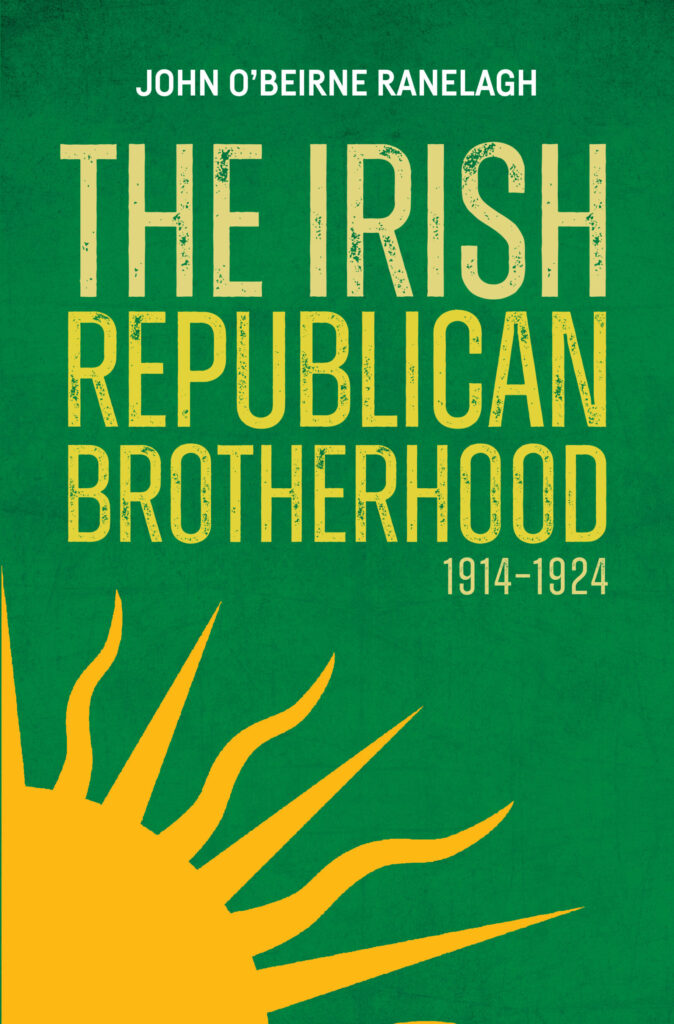
The Irish Republican Brotherhood, 1914-1924|John O’Beirne Ranelagh|Merrion Press
The Irish Republican Brotherhood—The full story of one of the most important organisations in Irish history
by Consulting Editor Tony Canavan
In most accounts of Irish history in the revolutionary period, the Irish Republican Brotherhood disappears from view round about the time of the War of Independence. I often wondered what happened to it and, like most, assumed that it blended into the Irish Republican Army. Even the excellent Soldiers of Liberty by Eva Ó Cathoir (which I reviewed for Books Ireland in 2018) only brings the history up to 1908. It was only recently, on seeing a newspaper article from 1924, did I discover that a Dáil committee had blamed the IRB for the Army mutiny of that year. So I am grateful to O’Beirne Ranelagh for filling in the blanks.
It is a detailed and dense book that examines every aspect of its subject
It must be said at the outset that this is not a book for the casual reader. The narrative does not flow along bringing the reader with it. It is a detailed and dense book that examines every aspect of its subject. The chapters are thematic rather than chronological, sometimes with enigmatic titles such as ‘Infiltration’, ‘Guns and Plans’, or ‘The Candidate’.
It comes with a glossary, biographies of all the main characters, appendices and footnotes. One could spend a long time mining this book for information. To be honest, all this does not make for an easy read but it is worth it to get the full story of one of the most important organisations in Irish history.
The author tells us that without the IRB there would have been no 1916 Rising or War of Independence; he does not mean that as a compliment. It is clear that O’Beirne Ranelagh has little sympathy for his subject and regards most of its leading members as fanatical. He sees the IRB as being part of a tradition that, from Wolfe Tone onwards, was devoted to achieving Irish independence through the use of violence, a tradition that continues among certain Republicans to this day. He sides with those who believe that what was achieved by the Anglo-Irish Treaty was little more than was already offered by the 1914 Home Rule Act. Be that as it may, O’Beirne Ranelagh presents all the evidence faithfully and readers can come to their own judgement.
The IRB was the first ‘full time’ revolutionary organisation in Ireland, similar to some that already existed elsewhere in Europe. This book follows its development, all the twists and turns, and ups and down, over the decades. One aspect that emerged early on was the conflict with the Catholic Church which was opposed to secret oath-bound organisations and urged conformity with British rule.
The IRB was the first ‘full time’ revolutionary organisation in Ireland, similar to some that already existed elsewhere in Europe
While many IRB members defied the Church, for others this was a moral dilemma. One imaginative solution was for the IRB to describe itself not as a secret organisation but an ‘army in hiding’. Nevertheless, the organisation thrived and played a key role in developments. It infiltrated almost every nationalist political and cultural organisation, taking control where it could, influencing where it could not.
It was largely thanks to the IRB that the Irish Volunteers got arms and became the instrument of the 1916 Rising. Likewise it was the IRB who provided the sinews of war for the fight for independence after 1918. In parallel to this, it was also involved in politics in a similar way, eventually taking control of Sinn Féin.
It infiltrated almost every nationalist political and cultural organisation, taking control where it could, influencing where it could not
Despite being anti-democratic to the extent that it rejected politics and saw itself as the legitimate authority in a self-declared republic, the IRB had some good qualities. Internally it was democratic. It had a constitution which was respected and altered when necessary. Individuals were elected by the members to positions of authority, and its ultimate aim was a secular, democratic republic. Even parliamentary movements in Ireland benefitted from the IRB, from the Land War of the 1880s to the agitation for Home Rule. Often the IRB provided the organisation and personnel that gave these impetus.
Individuals were elected by the members to positions of authority, and its ultimate aim was a secular, democratic republic
The most interesting chapter in the book is that dealing with the negotiations leading to the Anglo-Irish Treaty. There were internal divisions within the IRB and much negotiation among its leading members about what was acceptable. The chief figure in this was Michael Collins, who had came to control the IRB. O’Beirne Ranelagh makes the point that Collins was the IRB and that it was an instrument of his will. This worked well during the conflict but was harder once the Truce was announced.
There were internal divisions within the IRB and much negotiation among its leading members about what was acceptable
The author’s contention is that from early on Collins knew that a republic was never attainable and a dominion of the empire was the most that could be achieved. Consequently he entered negotiations with Lloyd-George knowing this would be the outcome. Up to and during the Civil War, Collins tried to ride two horses: on the one hand being an advocate of the Treaty and all that implied, while on the other trying to remain true to the republican ideal and unite all sides once again. His death ended this and led to an irrevocable split between the pro and anti Treaty sides.
His death led to the demise of the IRB. Once he was no longer there to drive, direct and control the organisation, it too divided and dissipated. O’Beirne Ranelagh’s depiction of Collins is interesting. He had scant regard for democratic or organisational norms. He often made decisions and issued orders without consulting the IRB Supreme Council or his cabinet colleagues. O’Beirne Ranelagh’s portrayal chimes with my view that had he lived Collins might have become an Irish Franco.
Without Collins, the IRB became rudderless
Without Collins, the IRB became rudderless. Its part in the 1924 Army Mutiny was its last hoorah, a last ditch defence of the republican ideal in the Free State. Many began to question its necessity within a democratic, independent state: even anti-Treaty Republicans were against it. Soon word came for it to disband. But did it? Even after the official winding up, some form of IRB seems to have existed up to 1936. Perhaps, to coin a phrase, it still has not gone away.












